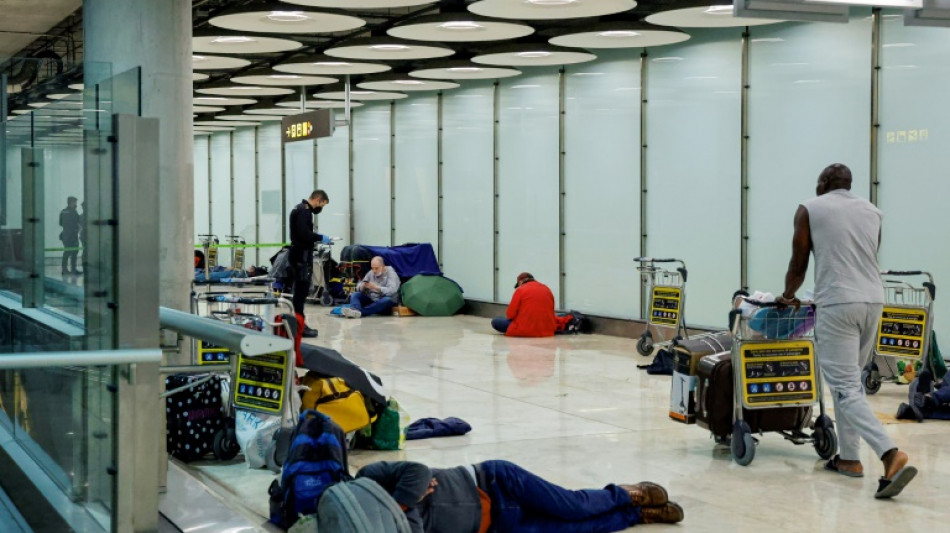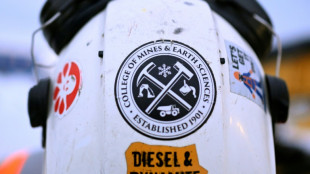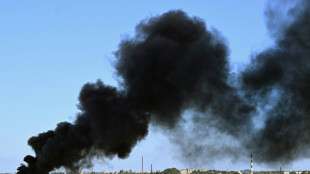

Homeless seek refuge at Madrid airport as rents soar
Victor Fernando Meza works during the day, but his salary is not enough to afford rent in the Spanish capital Madrid. So, once again, the 45-year-old Peruvian will spend the night at the airport.
On a sweltering May evening, Meza arrived at Barajas airport before 9:00 pm -- just in time to get past security. Any later, and people without a boarding pass are not allowed in under a new policy implemented a week ago to deter the hundreds of homeless people staying overnight.
The measure aims to address the rising number of people sleeping in Spain's busiest airport -- a situation thrust into the spotlight by images showing rows of people lying on the floor among bags and shopping carts, sparking a blame game between government officials.
Those who call Barajas home say the increased scrutiny in Europe's fifth busiest airport is unwelcome.
They doubt solutions will come and fear losing what they see as the safest place to sleep, compared to the streets or the metro in a city where homeless shelters have limited capacity.
"We just want to be left alone," Meza told AFP. "To be treated like people, not animals."
Meza blames Aena, the state-owned company that manages Spanish airports, for mishandling the humanitarian situation that has also occurred to a lesser extent in Barcelona, Gran Canaria, Malaga, Palma de Mallorca and Tenerife.
Aena argues its facilities were never meant to house hundreds of homeless people.
- 'Look down on you' -
Meza said the Barajas security guards know those who cause trouble in the airport.
"The ones who smoke, the ones who drink every day. They should be the ones kicked out, not all of us," he said.
Meza works occasional moving jobs and is hoping to save enough to rent an apartment with his brother. But like elsewhere in Spain, housing prices in the capital have soared and social housing is scarce.
The average monthly rent for a 60-square-metre (645-square-foot) apartment in Madrid has almost doubled to 1,300 euros ($1,415) from about 690 euros a decade ago, according to figures from real estate website Idealista.
Sleeping in Madrid's airport has taken a toll on Meza.
"People look down on you, there's still a lot of racism here," he said, adding that he plans to return to Peru when he turns 50.
Zow, a 62-year-old construction worker from Mali who spends his nights at Barcelona's airport, is also weary of the stares he gets.
"I don't like sleeping here. It's awful, everyone looks at you like this," he said, imitating a look of disdain.
- Blame game -
Around 421 people were sleeping rough at Madrid's airport in March, a survey by a Catholic charity group counted. Most were men, half had been sleeping at the airport for over six months and 38 percent said they had a job.
Nearly all of them would leave the airport during the day.
The issue has exposed deep divisions among the institutions tasked with addressing homelessness.
City and regional governments in Madrid have clashed with Aena, which operates under the control of Prime Minister Pedro Sanchez's Socialist administration.
"Primary social care is the responsibility of the local government," Aena said in a statement, adding the city must fulfil its "legal duty to care for vulnerable populations".
Madrid's conservative Mayor Jose Luis Martinez-Almeida fired back, arguing that the central government controls Aena and "what's happening depends on several ministries".
The city insists that most of those sleeping in the airport are foreigners who should fall under Spain's international protection system.
Despite the finger-pointing, both sides have agreed to hire a consultancy to count and profile those sleeping at the airport. The study results are expected by the end of June.
But Meza is sceptical.
"We don't want help. We don't want anything. We just don't want to be bothered," he said.
T.Meier--VZ



